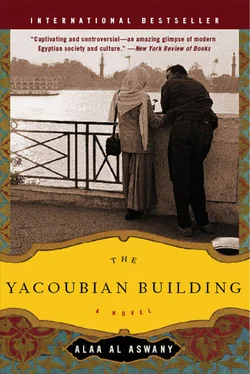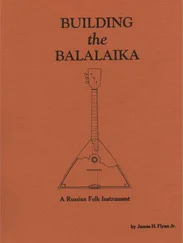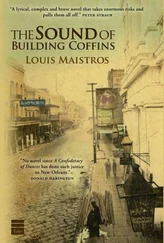Alaa Al Aswany - The Yacoubian Building
Здесь есть возможность читать онлайн «Alaa Al Aswany - The Yacoubian Building» весь текст электронной книги совершенно бесплатно (целиком полную версию без сокращений). В некоторых случаях можно слушать аудио, скачать через торрент в формате fb2 и присутствует краткое содержание. Год выпуска: 2006, ISBN: 2006, Издательство: Adobe Acrobat eBook Reader, Жанр: Современная проза, на английском языке. Описание произведения, (предисловие) а так же отзывы посетителей доступны на портале библиотеки ЛибКат.
- Название:The Yacoubian Building
- Автор:
- Издательство:Adobe Acrobat eBook Reader
- Жанр:
- Год:2006
- ISBN:978-0-06-087813-9
- Рейтинг книги:5 / 5. Голосов: 1
-
Избранное:Добавить в избранное
- Отзывы:
-
Ваша оценка:
- 100
- 1
- 2
- 3
- 4
- 5
The Yacoubian Building: краткое содержание, описание и аннотация
Предлагаем к чтению аннотацию, описание, краткое содержание или предисловие (зависит от того, что написал сам автор книги «The Yacoubian Building»). Если вы не нашли необходимую информацию о книге — напишите в комментариях, мы постараемся отыскать её.
The Yacoubian Building — читать онлайн бесплатно полную книгу (весь текст) целиком
Ниже представлен текст книги, разбитый по страницам. Система сохранения места последней прочитанной страницы, позволяет с удобством читать онлайн бесплатно книгу «The Yacoubian Building», без необходимости каждый раз заново искать на чём Вы остановились. Поставьте закладку, и сможете в любой момент перейти на страницу, на которой закончили чтение.
Интервал:
Закладка:
“Who says that they’ll leave us alone until the war starts? What makes you so sure? Today they detained dozens of cadres of the Islamic movement and tomorrow they’ll detain the rest, if we don’t resist them,” replied the young man vehemently.
Silence reigned and the atmosphere grew tense. The sheikh shot the young man a reproving look and said in the same calm voice, “I pray God that one day you may rid yourself of this excitable nature of yours, my boy. The strong Muslim is he who controls himself when angry, as the Beloved Prophet — God’s blessings and peace upon him — has taught us. I know that it is your love for your brethren and your zeal in defense of religion that drive you to this anger, and I assure you, my boy, and I swear to you by Him who is Sublime and All-Powerful, that we shall strike this infidel regime in battle, but at the right time, God willing.”
The sheikh fell silent for a moment, then looked at the young man for a while and added in a tone that brooked no reply, “This is my last word. I will do my best, God willing, to bring about the release of those detained; we have friends, praise God, everywhere. But I will not agree to a sit-in or demonstration at this stage.”
The young man hung his head, giving the impression that he had conceded only grudgingly, and it was not long before he asked permission to leave. He shook hands with those present, and when he came to the sheikh, he bent over him and kissed his brow twice, as though to erase any trace of the tiff. The sheikh responded with a kindly smile and patted him on the shoulder affectionately. After this, the students departed one after another until only Taha and Khalid were left. Khalid approached the sheikh and said, “Master. This is Brother Taha el Shazli, my colleague at the Faculty of Economics that I told you about.”
The sheikh turned to Taha welcomingly and said, “Welcome, welcome. How are you, my boy? I’ve heard a lot about you from your friend Khalid.”

At the police station, the battle heated up.
Hamid Hawwas accused Malak Khilla in an official report of usurping occupancy of the room and demanded that the matter be referred to court, while for his part Malak affixed to the report a copy of the rental contract for the room and insisted on making a second report in which he accused Hamid Hawwas and Ali the Driver of physically assaulting him and requested that his injuries be officially noted. As a result, they sent him with a policeman to the Ahmad Mahir Hospital, from which he returned with a medical report. This too was affixed to the report, Ali the Driver denying absolutely that he had assaulted Malak and accusing him of faking his injuries.
So much for the legal cut and thrust. As for the psychological war, each plunged in after his own fashion. Hamid Hawwas, for instance, never for a second stopped presenting legal arguments relating to the common resource of the residents of the roof, citing among other things various Court of Cassation rulings, while Abaskharon pleaded with the officer (after pulling up his gallabiya as was his custom in times of disaster to show off his amputated leg) with loud repeated wailing cries of, “Mercy, Your Honor, mercy! We just want to make a living, and they throw us out and beat us up!”
Malak’s own performance in police stations was unique. He had worked out long ago that police officers evaluated a citizen on the basis of three factors — his appearance, his occupation, and the way he spoke; according to this assessment, a citizen in a police station would either be treated with respect or despised and beaten. Given that Malak’s modest people’s suit could not be expected to leave any special impression on the officers and, equally, that his occupation of shirtmaker would not guarantee him sufficient respect, all that remained was how he spoke. As a result, Malak had become accustomed when for any reason he entered a police station to adopt the manner of a businessman preoccupied with urgent and serious affairs who was extremely perturbed at being detained in this fashion and would speak to the officers in a language approaching the classical tongue that would make them hesitate before underestimating him. He would say any old thing and then shout in the officers’ faces to stress the point, “You, sir, are apprised of this and I am apprised of this! The honorable station chief is apprised of this! The esteemed District Chief of Police is likewise apprised of this!”
The use of the classical plus the mention of the district chief of police (as though he were an intimate acquaintance whom he intended to contact) were effective ways of making the officers grudgingly draw back from treating Malak with contempt.
So there they all were — Abaskharon and Malak and Hamid Hawwas standing in front of the officer and yelling without let-up, while behind them the drunkard Ali the Driver, like an old hand on the bass who knows how to make his contribution to the music, kept repeating in his deep, husky voice, over and over again, the same words: “Sir, there are women and families on the roof! We can’t have apprentices violating the sanctity of our families, sir!”
The officer had become completely fed up with them and, were it not for his fear of the consequences, would have told the goons to hitch them all to the bastinado and beat them. In the end, however, he endorsed the report for referral to the public prosecutor and the contestants stayed in the detention room till the following morning, when the public prosecutor issued an order permitting Malak to have the use of the room “and the injured parties to have recourse to the courts.” Thus, Malak returned victorious to the roof, men of goodwill subsequently intervening and reconciling him with his opponents Ali the Driver and Hamid Hawwas (who made a show of accepting the reconciliation but never stopped writing — and conscientiously pursuing — complaints against him).
The prosecutor’s order was, however, a springboard for Malak, who in one week transformed the appearance of the room. He closed the door that opened onto the roof and opened a large door onto the main stairwell, where he hung a large plastic sign on which he wrote in Arabic and English Malak Shirts . Inside he placed a large cutting table and some chairs for waiting customers and on the wall he hung a picture of the Virgin Mary along with a copy of an article in English from the New York Times with the headline “Malak Khilla, Superb Egyptian Tailor,” in which the American journalist spoke for a whole page about the skill of Master Craftsman Malak Khilla; in the middle was a large picture of Malak with the tape measure around his neck completely absorbed in cutting a piece of cloth and apparently unaware that he was being photographed.
If anyone asks him about the article, Malak tells them that a foreigner (who later turned out to be the Cairo correspondent of the New York Times ) came one day to have some shirts made and that Malak had been astonished to find him returning the following day with foreign photographers and they had written this piece about him because they were so amazed at his tailoring skill. Malak tells this story in an ordinary way, then steals a look at his listeners. If he finds them fidgety and dubious, he moves on to talk of something else as though he’d said nothing. If they appear to believe him, however, Malak will continue, emphasizing that the foreigner had insisted vehemently that he should go with him to America to work there as a shirtmaker at any salary he cared to name but that he, of course, had refused the offer because he hated the idea of living away from Egypt. Malak brings his set piece to an end by saying complacently and confidently, “Everyone knows that all those foreign countries are sniffing around for clever shirtmakers.”
Читать дальшеИнтервал:
Закладка:
Похожие книги на «The Yacoubian Building»
Представляем Вашему вниманию похожие книги на «The Yacoubian Building» списком для выбора. Мы отобрали схожую по названию и смыслу литературу в надежде предоставить читателям больше вариантов отыскать новые, интересные, ещё непрочитанные произведения.
Обсуждение, отзывы о книге «The Yacoubian Building» и просто собственные мнения читателей. Оставьте ваши комментарии, напишите, что Вы думаете о произведении, его смысле или главных героях. Укажите что конкретно понравилось, а что нет, и почему Вы так считаете.












